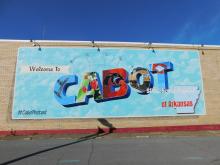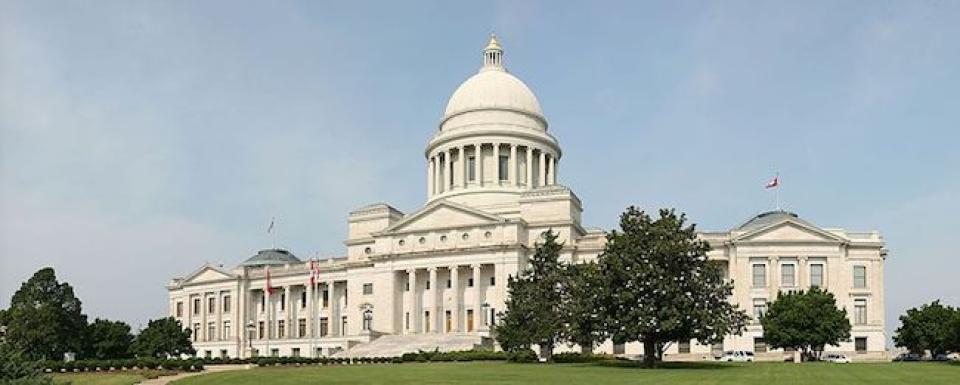
Fast, affordable Internet access for all.

Construction on a new city-owned fiber network in Cabot, Arkansas will soon bring affordable broadband access to every city resident and business in the state’s “Strawberry Capital.”
The network comes courtesy of a partnership with Connect2First, the broadband subsidiary of local power company First Electric Cooperative Corporation, which continues to build on its significant presence across Arkansas.

According to a city announcement, the $20 million network will deliver fiber access at symmetrical speeds of up to 10 gigabit per second (Gbps) via an XGS-PON network passing all 26,000 residents and businesses of Cabot using 220 miles of fiber.
The network, which is expected to take several years to complete, will be built on the back of resident-approved bonds, and won’t utilize state or federal funding.
Construction has already begun in this suburb of Little Rock where city officials say hundreds of residents have already been connected.
In announcing the beginning of construction, Cabot Mayor Ken Kincade said:
“This unique project is the first of its kind in the state of Arkansas where a municipality has built its own fiber network and partnered with a local ISP to provide high speed fiber optic internet services to its constituents. The City of Cabot is thrilled to be able to leverage the proven expertise of Connect2First, who already had a presence in the city and was currently serving surrounding areas.”

Connect2First says it has constructed 4,371 miles of fiber network across 18 Arkansas counties, with over 600 miles of installations left to go as of last December. Sales and Marketing Director Candace Looper recently told FierceNetwork that the company has 30,000 active subscribers and is seeing a 40 to 60 percent take rate in markets where its fiber has been deployed.
Connect2First officials say their consulting team is reviewing “any opportunities” to tap into the $42.5 billion Broadband Equity, Access and Deployment (BEAD) program to help deliver fiber to unserved or underserved across Arkansas. The state is expected to obtain a little over a billion dollars in BEAD funding over the next several years.
Made Possible By Elimination Of Harmful, Monopoly-Backed State Law
Until fairly recently, Arkansas municipalities were prohibited from owning broadband networks because of a counterproductive and restrictive law lobbied for by regional telecom monopolies. The law, first passed in 2011, was designed to protect these uncompetitive monopolies from competition and disruption (17 states currently have similar legislation on the books).

Things finally changed in 2021. Frustration at substandard broadband during the onset of Covid lockdowns culminated with the passage of SB 74.
SB74 allows Arkansas government entities “to acquire, construct, furnish, or equip facilities for the provision of voice services, data services, broadband services, video services, or wireless telecommunications services” so long as they “partner, contract, or otherwise affiliate with an entity that is experienced in the operation of the facilities.”
SB74 also requires municipalities interested in owning and operating municipal broadband networks to conduct due diligence and provide 10-days’ notice before holding a public hearing.

It also allows Arkansas municipalities to issue general obligation bonds or use taxes to fund network construction; previously restricted to third-party grants or loans.
State laws restricting community broadband were revealed as hugely counterproductive during the peak of the pandemic, when communities across the country got a crash course in the importance of affordable and reliable broadband thanks to a massive boom in telecommuting and home education.
It proved to be a tipping point, as residents in several states – including Arkansas and Washington – voted to eliminate state restrictions on publicly-owned, locally-controlled broadband systems, opening the door to greater creativity and flexibility when it comes to municipal broadband solutions.
Cabot Mayor Ken Kincaide was an avid supporter of SB74 during the prelude to its passage.
“We’re not asking for money,” Kincaide told attendees of a hearing before the Arkansas State Senate Agriculture, Forestry and Economic Development Committee. “We’re asking for the handcuffs to be removed.”
Cooperatives Once Again Challenge Concentrated Monopoly Power
Like so many U.S. communities, Cabot sees limited regional competition between a handful of large telecom monopolies, including Comcast and Brightspeed (formerly Centurylink). That limited competition results in spotty access, high prices, slow speeds, and statistically some of the worst customer satisfaction rankings of any industry in America.
Much like the electrification of rural America a century ago, cooperatives are playing a significant role in finally providing affordable service to long-neglected communities.

Connect2First is part of First Electric Cooperative Corporation, a nonprofit electric distribution cooperative and the first electric cooperative in Arkansas. First Electric was first incorporated in 1937 with three employees and 150 members. Today, the cooperative services more than 100,000 member accounts across 18 counties, with 10,100 miles of power lines.
The city of Cabot is technically outside of First Electric Cooperative’s traditional electric utility footprint. But things changed when Cabot passed a bond issue to help build its own citywide fiber infrastructure, and tasked Connect2First to build, maintain, and operate the finished network inside city limits.
“It is inspirational to see forward-thinking, can-do rural municipalities like the City of Cabot come up with innovative ways to bring to their residents and businesses extraordinary communications services and experiences,” says Candace Looper, Director of Sales and Marketing, Connect2First.

In markets where Connect2First has expanded into broadband, locals usually have the option of symmetrical 200 megabit per second (Mbps) service for $60 a month; symmetrical 500 Mbps service for $70 a month; or symmetrical 1 Gbps service for $100 a month.
Unlike Comcast, the cooperative’s offerings don’t include usage caps, hidden fees, or long-term contracts.
Looper has indicated residential customers in Cabot should see speeds upward of symmetrical 2.5 Gbps eventually; businesses will see access at speeds up to 10 Gbps.
To give residents a sense of how network construction proceeds, Connect2First maintains a service map detailing which areas have already been connected.
The city’s effort has already won a “project of the year” award from the Arkansas chapter of the American Planning Association, which noted the “monumental” feat of not only addressing the city’s longstanding digital divide – but directly challenging and reversing harmful state legislation that made uniform, affordable connectivity harder to deliver.
Header image of painted Welcome to Cabot postcard courtesy of Jimmy Emerson, CC BY-NC-ND 2.0 DEED Attribution-NonCommercial-NoDerivs 2.0 Generic
Inline image of bowl of strawberries courtesy of Rob Bertholf, CC BY 2.0 DEED Attribution 2.0 Generic
Inline image of flags in downtown Cabot courtesy of Wikimedia Commons, CC BY-SA 4.0 DEED Attribution-ShareAlike 4.0 International
Inline map of Cabot courtesy of Wikimedia Commons, CC BY-SA 3.0 DEED Attribution-ShareAlike 3.0 Unported
